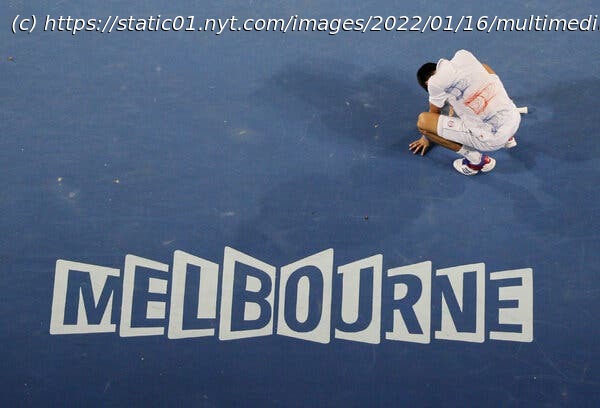Djokovic has rebounded from demoralizing periods in the past, but talented players are coming behind him, and his anti-vaccine stance has made him a global target.
Even after being ejected from Australia, Novak Djokovic will remain No.1 in the men’s tennis rankings at the end of the Australian Open, which began on Monday without him. He still holds the titles at the French Open and Wimbledon; still has supple limbs, formidable tennis skills and a deep history of resilience in the face of hostile crowds and long odds. But in a what-have-you-won-for-me-lately sport that is often categorized by eras and the champions who define them, it would come as no surprise if Sunday marked a turning point, symbolized by his long, grim walk to the airport gate in Melbourne under the escort of immigration officials. Djokovic is 34, and as he left Australia against his will after his visa was canceled, a new generation of taller, talented stars in men’s tennis was preparing to pursue the title at the Grand Slam tournament he has dominated like no other and may never play again, if his three-year ban from the country is not rescinded. “This certainly could knock him back,” John Isner, a friend of Djokovic’s and one of the top-ranked American players, said on Sunday. “I honestly don’t know which way it will go. It could take him a long time to recover, or light a fire under him.” Djokovic has rebounded from demoralizing periods in the past and resumed winning. In 2017, after perhaps the most dominant phase of his career, he struggled with his motivation and lost his edge for more than a year amid personal problems and a persistent right elbow injury. He had a commitment to natural healing that foreshadowed his decision not to be vaccinated for the coronavirus. But after playing and struggling at the Australian Open in 2018 with his elbow supported by a compression sleeve, he decided, tearfully he has said, to undergo surgery. Five months later, he was a Grand Slam champion again, winning the 2018 Wimbledon title and soon re-establishing himself as No.1, at the expense of his career-long rivals, Roger Federer and Rafael Nadal. In early 2020, Djokovic was still on a roll, starting the year with 18 straight victories before the pandemic shut down the sport for five months in 2020. He organized an ill-advised exhibition tour in Serbia and Croatia in June during the enforced break that turned into a superspreader event and public-relations bonfire as he and other players and team members, including Djokovic’s coach Goran Ivanisevic, danced and partied unmasked in a Balkan nightclub, thoroughly out of sync with the global mood. The tour was canceled. Djokovic; his wife, Jelena; Ivanisevic; and others tested positive for the coronavirus, and when Djokovic did return to Grand Slam action, at the 2020 U.S. Open, he proceeded to eliminate himself from the tournament in the fourth round by hitting a ball in frustration after losing his serve and inadvertently hitting a lineswoman in the throat. He was defaulted by the tournament referee and returned to Europe to regroup.






